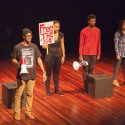OMAI presents Line Breaks Festival at the Overture Center
A major local hip-hop event, the annual Line Breaks Festival, will bring new aesthetics in contemporary performance to the University of Wisconsin–Madison campus and community from Friday, March 16 through Saturday, March 24.
The event is presented by UW–Madison’s Office of Multicultural Arts Initiatives (OMAI). For a complete rundown of the festival’s schedule, click here.

Niko Tumamak, a First Wave performer, presents a spoken-word and dance piece during the Line Breaks Festival in 2010.
Photo: Jeff Miller
“In this sixth annual Line Breaks Festival, we partner for the second time with Overture Center for the Arts in presenting the festival in their Rotunda Studio, a black box space transformed to host the largest hip-hop centered performance festival in the Midwest,” says Willie Ney, executive director of OMAI, which operates under the Office of the Vice Provost for Diversity and Climate and oversees the First Wave Hip-Hop Theater Ensemble.
The festival line-up features professionals from the stages of Europe to the East Coast and Chicago to San Francisco along with members of the First Wave Hip-Hop Theater Ensemble.
Blending movement with music, spoken word and photography, Hapa Bruthas is the Thursday, March 22, cooperative production by Hapasan, a multiracial Japanese American capoeirista and house dancer based in the Bay Area and UW–Madison alumna Queen Gidrea, a.k.a. Chanel Matsunami Govreau, a performance storyteller, printmaker and costume designer. Hapa Bruthas explores brotherhood, the privacy of attraction and interracial dating in Asian American communities from a multiracial perspective. Hapa Bruthas is also sponsored by the Asian American Student Union, Multicultural Student Coalition, Omulu Capoeira Madison and faculty sponsor Peggy Choy.
Robert Sacheli, chief theater critic of the Times of London, last week lauded Line Breaks headliners Paul Oakley Stovall and Brad Simmons’ debut of “The Next Best Thing to Love” duo show in Washington, D.C., as “the real thing.” Stovall and Simmons will bring their hit to the Overture stage on Friday, March 23, following a guest opening by the 2012 UW–Madison College Unions Poetry Slam Invitational (CUPSI) Team.
“The visible ease and energy of their onstage collaboration and their offstage friendship is one of the chief pleasures here,” Sacheli wrote. “These gents clearly get a kick out of singing with each other, and as a result, so does everyone else. Stylish, cool, funny, romantic, and touching…”
The return of emerging Brooklyn artist Queen GodIs is scheduled for Saturday, March 24. “Heir Plain” is an in-progress self-exploratory work where Queen GodIs plays with winged-words to express her spiritual relationship to “flight” amidst her physical relationship to “landing.” The budding producer and musical visionary’s work deliberately engages the audience through antiphony and other participatory methodologies.
Beginning Friday, March 16 through Wednesday, March 22, members of the First Wave Hip-Hop Theater Ensemble will perform, including the fifth cohort debut of Common Denominator, the First Wave Touring Ensemble production “Shock,” and solo and duo performances by selected First Wave artists.
It was six years ago Mark Bamuthi Joseph’s residency with the Arts Institute culminated in a festival of talk and performance around the question, “What Is Hip-Hop?” Ney says.
OMAI continues that investigation by cultivating new aesthetics in contemporary presentation of performance art by investing in building relationships with industry-leading artist professionals and aspiring student artists.
Line Breaks remains a place for new student work to be developed supported and premiered, and a way to bring the First Wave work to the broader Madison community.
“In this regard all Line Breaks activities are free and open to the public and are represented in easily accessible spaces,” Ney says. “These narratives are the beginning of the conversation and we encourage our audiences to stay for a 30 minute discussion following each performance. It is our hope that audience members leave the theater with a sense of understanding that these personnel narratives, have at their root, a truth that opens the eyes of society to personal spaces otherwise unreachable.”



